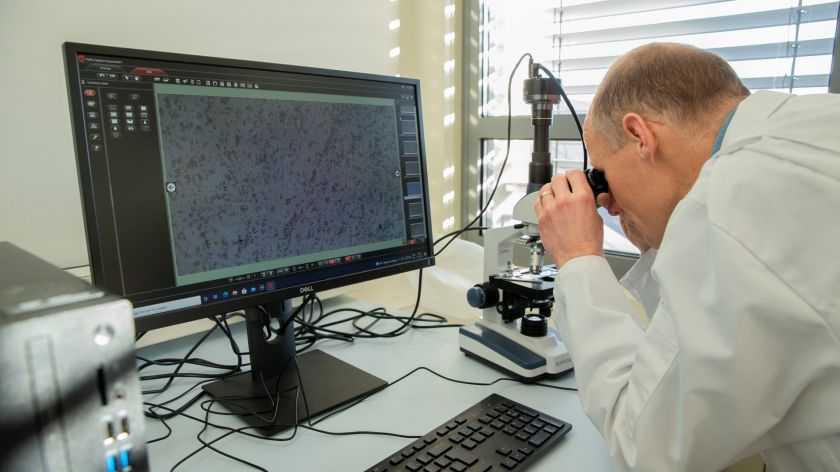Uncertainty over incentive grants remains, fear of increase in temporary contracts
-
 Dennis Vriezema bestudeert microcapsules in de microscoop. Foto ter illustratie. Fotograaf: David van Haren
Dennis Vriezema bestudeert microcapsules in de microscoop. Foto ter illustratie. Fotograaf: David van Haren
Minister of Education Robbert Dijkgraaf wants to reduce the work pressure at universities with 300 million euros a year. But the precise distribution of the money has yet to be determined – and researchers fear that the money will lead to more temporary contracts. Radboud University opts for a pragmatic distribution of the money.
The plan of Minister of Education Robbert Dijkgraaf sounded great: give researchers money at the start of their careers to get their research going. The idea is part of the minister’s plan to reduce work pressure amongst scientists. 300 million euros will be allocated annually to the project from now on, Dijkgraaf announced last year. But some critical voices remain. Why is that?
The starting and incentive grants are a new form of research funding that is supposed to give scientists more room to breathe. All newly appointed assistant professors should henceforth receive a so-called starter grant of 300,000 euros, once they receive a permanent contract. 156 million euros worth of funding have been reserved for these new grants. Universities are allowed to distribute the rest of the funding among other academic staff in the form of so-called incentive grants.
22.5 million euros
Right now, Radboud University receives 22.5 million euros a year for starting and incentive grants. The problem? The ministry did not set any clear rules for the distribution of the money. Should it, for example, go to individual researchers or teams? And how do you prevent the grants from becoming yet another form of competition between scientists within the same department? Next to that, it’s already clear that the 156 million will not be enough to provide all new assistant professors with 300,000 euros.
‘It’s great that there is extra money, but it is a bit impractical that it’s been made available before the rules were fully clear’, says Carlo Ierna, philosophy researcher at Radboud University and assistant professor at the University of Amsterdam (UvA). Ierna previously wrote a critical opinion piece (in Dutch, ed.) about the grants in ScienceGuide.
Creative solutions
Radboud University is also struggling with the lack of clarity surrounding the distribution rules, according to a spokesperson. ‘The result is that universities now take some policy leeway in implementing the grant system.’ In Nijmegen, this means that the 22.5 million euros in grants are distributed amongst the faculties in proportion to the number of students that are enrolled. Additionally, spending plans should tie in with ongoing research. The spokesperson: ‘This grant should therefore not lead to a new line of research.’ Assistant professors also have to explain how the grant contributes to reducing work pressure.
Creative solutions have been devised to address the problem of too few grants for all of the new assistant professors in Nijmegen. For example, some assistant professors will receive their starter grants at a later point. Should this be insufficient, then sharing a research project will be considered in consultation with the assistant professors.
‘An assistant professor who gets money to do more research will logically be able to teach less’
The lack of rules is not the only problem. Philosophy researcher Ierna, who is also active in the action group WOinAction, expects the grants to lead to more temporary lecturers. ‘Just think about it’, he explains. ‘An assistant professor who gets money to do more research will logically have to teach less. Temporary lecturers will be appointed for that.’
They are the real starters, Ierna stresses, but they are not getting any money under this funding plan. ‘It would make much more sense to use this money to give them a permanent job in addition to research time. That way they become full-fledged assistant professors.’
Advisory report
So what now? A committee led by Utrecht professor Bert Weckhuysen is currently looking into all of the implementation issues. It is receiving input from WOinAction, among others, in this regard. The committee had promised the minister an advisory report at the end of last month but is now postponing this until the end of June. Among other things, it first wants to evaluate the results of a recent consultation meeting for scientists in Utrecht.
Translated by Jan Scholten



